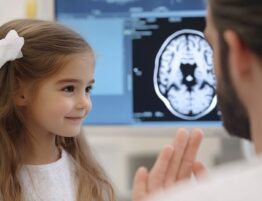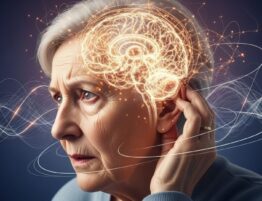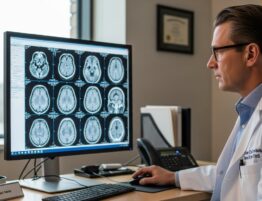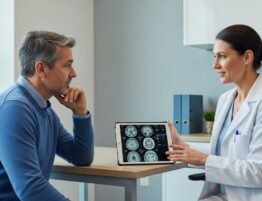Alzheimer’s disease is a growing concern worldwide. It affects millions of people and their families every year. This progressive brain disorder slowly damages memory, thinking, and behavior over time. Catching it early can make a significant difference in managing the disease. Early detection also helps improve quality of life for patients.
Alzheimer’s biomarkers are measurable indicators in the body. They can show if someone has or is at risk of developing Alzheimer’s. Biomarkers act like clues that help doctors detect the disease early. They work before symptoms become severe or noticeable. Early diagnosis allows for better planning, treatment, and family support. It can slow the disease’s progression and give patients more time to live well.
Biomarkers are crucial because Alzheimer’s often begins years before symptoms appear. By the time memory problems or confusion show up, significant brain damage may exist. Biomarkers help identify changes in the brain or body early on. This gives doctors a chance to intervene sooner than before. They also help confirm diagnoses and track disease progression over time. Additionally, biomarkers guide treatment decisions for individual patients.
This article explores several important topics about Alzheimer’s biomarkers. We’ll cover the types of biomarkers and how they connect to symptoms. We’ll also discuss new diagnostic tools and their role in managing neurological diseases. Finally, we’ll examine challenges in biomarker development and why early detection matters.
Types of Biomarkers Used in Alzheimer’s Detection
Biomarkers for Alzheimer’s come in different forms. Each type offers a unique way to detect the disease. They can be found in the brain, spinal fluid, or blood. Each type provides valuable insights into brain health. Here are the main types of biomarkers used today:
- CSF Biomarkers. Cerebrospinal fluid is the clear liquid surrounding the brain and spinal cord. Doctors collect it through a spinal tap procedure. They test it for specific proteins linked to Alzheimer’s like amyloid-beta and tau. These CSF biomarkers build up abnormally in Alzheimer‘s patients’ brains. Their levels in CSF can indicate if the disease is present. CSF tests are highly accurate but require an uncomfortable procedure.
- Blood Tests. Blood tests are a newer and less invasive detection method. Scientists have discovered that certain proteins like p-tau181 can be measured in blood. These proteins indicate Alzheimer’s-related changes in the brain. Blood tests for dementia are easier to perform than spinal taps. They could make screening more accessible to more patients. While still being refined, they show great promise for widespread use.
- Neurodegenerative Biomarkers. These are indicators of brain cell damage or loss. They’re often seen in Alzheimer’s and other brain diseases. They include proteins like neurofilament light found in blood or CSF. These markers show how much the brain is affected by disease. They help doctors understand the severity of brain damage.
Each type of biomarker gives doctors important information. Together, they help build a clearer picture of brain health. These tools make diagnosis more accurate than symptoms alone. They reduce dependence on observable changes that appear late in disease progression.
Early Symptoms of Alzheimer’s and Biomarker Correlation
Recognizing early signs of Alzheimer’s is critical for catching the disease early. These symptoms can be subtle and are often mistaken for normal aging. Common early symptoms include:
- Forgetting recent events or conversations
- Trouble finding words or following discussions
- Misplacing items and struggling to retrace steps
- Difficulty planning or solving problems
- Feeling confused about time or place
These symptoms often appear gradually and are hard to notice initially. However, they connect directly to brain changes that biomarkers can detect. For example, high levels of amyloid-beta or tau may show up before memory problems become obvious. These biomarkers act like an early warning system for the brain. They signal that Alzheimer’s processes are starting before symptoms appear.
The connection between symptoms and Alzheimer’s biomarkers is crucial for early detection. Memory issues might correlate with amyloid plaques in the brain. These are sticky protein clumps that disrupt normal brain function. Tau tangles are another hallmark of Alzheimer’s disease. They can be detected through biomarkers and may relate to thinking problems. By linking early symptoms to biomarker results, doctors can confirm Alzheimer’s as the cause. This allows them to start treatment sooner than before.
Advances in Diagnostic Tools for Alzheimer’s
The field of Alzheimer’s diagnosis is advancing rapidly with new tools. These new diagnostic methods make it easier to spot the disease early. Technology helps doctors detect biomarkers more accurately and with less patient discomfort. Some of the latest advancements include:
- Improved Blood Tests. Blood tests are becoming more reliable for detecting Alzheimer’s-related proteins. They’re faster, cheaper, and less invasive than CSF tests. This makes them a game-changer for routine screening programs.
- Brain Imaging. Techniques like PET scans can now show amyloid and tau buildup. These scans are becoming more precise over time. They help doctors see Alzheimer’s-related changes before symptoms become severe.
- Digital Tools. Apps and computer-based tests can track subtle changes in memory. They can also monitor thinking skills over time. These tools work alongside biomarkers to catch early warning signs.
- AI and Machine Learning. Artificial intelligence helps analyze biomarker data more effectively. It can spot patterns in test results that humans might miss. This leads to faster and more accurate diagnoses for patients.
These diagnostic tools make Alzheimer’s diagnosis less invasive and more accessible. They also allow doctors to catch the disease earlier than before. This can lead to better outcomes for patients and families.
Clinical Importance of Biomarkers in Neurological Disease
Biomarkers aren’t just important for Alzheimer’s disease alone. They play a significant role in managing other brain-related conditions. Neurological disease markers help doctors understand diseases like Parkinson’s and multiple sclerosis. They’re also useful for other forms of dementia. For Alzheimer’s, biomarkers have several key uses in clinical practice:
- Diagnosis. Biomarkers confirm whether symptoms are caused by Alzheimer’s or other conditions. For example, depression or vitamin deficiencies can mimic Alzheimer’s symptoms. Biomarkers help distinguish between these different causes.
- Tracking Progression. Doctors measure biomarkers over time to see disease progression speed. This helps them adjust treatment plans as needed. Regular monitoring provides valuable information about disease development.
- Personalized Treatment. Biomarkers help doctors choose the right therapies for each patient. Some drugs work better when started early in the disease. Biomarkers can show who might benefit most from specific treatments.
- Clinical Trials. Biomarkers help researchers select appropriate patients for studies. They also measure how well new treatments work in trials. This speeds up the development of new therapies.
Neurological disease markers provide clear and measurable data for better care decisions. They give patients and families more clarity about what to expect. This makes planning and preparation much easier for everyone involved.
Challenges and Future Research in Biomarker Development
Biomarkers are incredibly helpful, but challenges still exist in using them for Alzheimer’s. Developing reliable biomarkers isn’t easy, and several hurdles need to be overcome:
- Accuracy. Some biomarkers, especially newer blood tests, need more refinement for better accuracy. False results could lead to incorrect diagnoses and inappropriate treatments. Researchers are working to improve test reliability.
- Accessibility. Tests like Alzheimer’s CSF biomarker collection or PET scans can be expensive. They’re also hard to access in rural areas or low-income communities. This limits who can benefit from early detection.
- Complexity. Alzheimer’s involves many changes in the brain simultaneously. No single biomarker can tell the complete story of the disease. Combining multiple tests can be complicated and costly for patients.
- Early Detection. Biomarkers need to work well in very early disease stages. They must be effective when symptoms aren’t obvious yet. This remains a significant challenge for researchers.
Researchers are tackling these challenges by developing more sensitive tests. They’re also finding ways to make tests more affordable and accessible. Scientists are exploring new biomarkers found in saliva or retinal imaging. These could be much easier to collect than current methods. The future looks promising with ongoing efforts to make biomarkers more reliable. Research continues to make them more widely available to patients.
Summary and Importance of Early Detection
Alzheimer’s is a challenging disease, but early detection makes a huge difference. Alzheimer’s biomarkers are powerful tools for spotting disease before major damage occurs. These include CSF tests, blood tests, and neurodegenerative markers. They help connect early symptoms to brain changes effectively. Biomarkers also guide treatment decisions and improve patient outcomes significantly. New diagnostic tools are making Alzheimer’s detection easier than before. Ongoing research continues to overcome current limitations in the field.
Early detection is crucial because it gives people a chance to take control. It allows for earlier treatment that can slow symptoms and improve life quality. Early detection also gives families time to plan and access support resources. If you or someone you know notices memory changes or early symptoms, don’t wait. Talk to a doctor about available testing options.
Don’t let Alzheimer’s define your future or limit your possibilities. Expert neurology clinics offer personalized care and cutting-edge treatments. They also provide compassionate support for patients and families. Taking control today by consulting specialists can make a real difference. Early action truly matters for better outcomes. Consider scheduling an appointment to start your journey toward hope and clarity.
Raising awareness about Alzheimer’s biomarkers helps more people get needed help sooner. Encouraging testing can lead to earlier interventions and better outcomes. Together, we can make significant strides in fighting Alzheimer’s disease. We can also better support those affected by this challenging condition.












Please, leave your review
Write a comment: